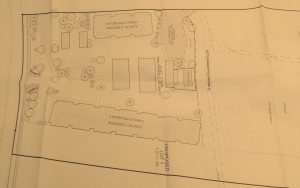
BERLIN – A property owner shared plans to build an 80-unit apartment complex on North Main Street with town officials this week.
Engineer John Salm met with the Berlin Planning Commission Wednesday to talk about his plans for Victorian Oaks, an 80-unit luxury apartment complex on seven acres on North Main Street. Commission members were quick to express concerns about the density of the project, which as proposed includes two four-story buildings.
“I understand what you’re trying to do but this is just one more step to Berlin becoming Salisbury,” commission member Ron Cascio said. “That’s how I feel.”
Salm’s property, located on the east side of Route 818, is not currently part of the town. The land is located north of Old Ocean City Boulevard and south of Route 50. According to Joe Moore, Salm’s attorney, the property would have to be annexed into the town so Salm could move forward with residential development, as the property is currently zoned C-2 commercial in the county. Moore pointed out that the property was in the town’s growth area and its development would fit in with the town’s comprehensive plan.
Salm said he and his wife had purchased the property in 2007 and moved their office there. They’ve also built some self-storage units and leased office space on the site.
“It’s a good little complex,” he said. “What I have envisioned is elsewhere on the property I think there is a real need for quality multi-family housing in close proximity to the center of town.”
He wants to build Victorian Oaks, which would include 80 units, a pool and a dog park, to meet that need. He said the project could foster connectivity between North Main Street and Berlin’s downtown.
“We’ll put in shared use path right on the front of our property,” he said.
Salm said the reason he was coming to the town with the project was because if he were to develop the land in the county, he would have to develop it commercially, as he didn’t have the sewer capacity for residential development.
“The only way I could have even contemplated this is the provision of public water and sewer,” he said.
Before beginning the annexation process, Salm said he wanted the commission’s thoughts on the project.
Commission member Newt Chandler said he thought the density was too much.
“It’s a huge building on the skyline over there,” he said. “I just think it’s a lot of people. Where are they going to go? What are they going to do?”
Moore said they would find plenty to do downtown.
“I think there’s a hell of a lot to do in Berlin,” he said. “It’s not like going to Crisfield… I’ve lived here longer than anybody in this room’s even been alive and I’m now making reservations to go to the Atlantic Hotel or standing in line at Blacksmith. I know that’s not the way you meant it but there’s plenty to do.”
Commission member Matt Stoehr said he thought the project was needed in the area.
“Housing is skyrocketing in Berlin,” he said. “Most people can’t afford to move to Berlin and I know people who want to live downtown but they just can’t … To me this is something I’ve been waiting for Berlin to look at for awhile.”
He added, however, that pedestrian access to the downtown area would be critical with such a development.
Cascio said the project was similar to Oceans East.
“The people who live here don’t like it,” he said.
Moore said there were a lot of differences between the two projects.
“As far as density? As far as the structures being huge?” Cascio replied. “I’m totally against annexation for residential use that the town’s people will end up subsidizing. That’s exactly what happens with residential subdivision when it’s out of town. We end up subsidizing.”
Salm said the property could be developed as contractor shops, warehouses, self-storage or small retail with its current sewer capacity and zoning.
“It’s going to get developed one way or the other,” he said.
Cascio said he was simply speaking up for the people he represented.
“At some point Berlin is not going to be the town that people want to come to anymore,” he said. “I know people who are ready to move out with some of the stuff that’s going on.”
Moore pointed out residential development on the site would lead to less traffic than commercial development.
When Cascio again referred to the project’s “massiveness,” Salm acknowledged that it was large but said it would provide residents with access to Berlin’s downtown.
“We want proximity, we want connectivity, to the center of town,” he said. “Putting this out somewhere else doesn’t seem to make sense.”
Chris Denny, chair of the commission, asked if Salm was dead set on four-story buildings. Salm said changing the building size would change the economics of the project and that he’d have to rework his plans.
“I suggest you head in that direction,” Cascio said.
Stoehr asked if Salm had considered townhouses.
“The townhomes just can’t be built affordably,” Salm said.
Cascio said he would not support the annexation that would come as the first step in the potential residential development process.
“Maybe I can wow you with my footwork Ron,” Moore said.
“Start dancing Joe,” Cascio replied.

